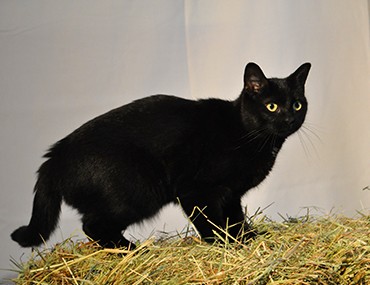Background
The Bombay arrived in Louisville, Kentucky during the 1950’s when breeders crossed a Burmese and a black American shorthair. Among other breeds, the Bombay was initially created to look like the Indian black panther (a miniature wild cat). The breed was then named after the Indian city of Bombay, which is now Mumbai.
In the United Kingdom, instead of crossing a Burmese with a black American shorthair, Burmese were crossed with black British shorthairs. The main difference between the American Bombay and the British Bombay is eye color. American cats have gold, orange or copper-colored eyes, while British cats can have golden or green eyes.
Cat Facts
- The Bombay is a black panther’s “mini-me”
- The Bombay is a medium sized cat who is very muscular
- Their ears have a slight curve and are widespread
- The Bombay has very distinct golden eyes, which have been called “new-penny eyes”
- As kittens, Bombays are born with a faint tabby-like striping, which fades as they grow
What are they like?
Bombay cats are fun loving, outgoing, playful, and gentle. They’re very popular with families because Bombays are very tolerant of young children. They’re also good around dogs, and other cats.
Some Bombays can be exceptionally vocal, while others you rarely hear. This depends on the actual personality of each cat. Bombays are strong and agile but they’re not particularly energetic.
The Bombay generally enjoys a healthy life but there are a few issues that affect this breed more commonly than others:
- Hypertrophic cardiomyopathy
- Excessive tearing of the eyes
- Rare breathing problems (because their snout is on the shorter side)
Right for you?
- Love to eat: But who doesn’t? Bombays can gain weight pretty easily, so monitoring food is a must.
- Easy grooming: Because the Bombay has very short, fine and shiny hair, they hardly shed. If you use a rubber brush, rather than a prickly one, it’ll be easier for you because they’ll get a little massage out of it as well!
- Love people: These cats are so friendly that even strangers or new people won’t scare them away. However, because they are so friendly, they need a lot of attention.
If you have any questions or concerns, you should always visit or call your veterinarian – they are your best resource to ensure the health and well-being of your pets.
